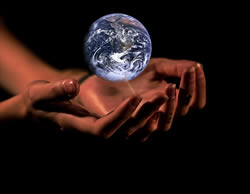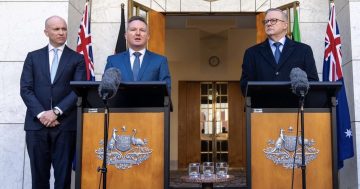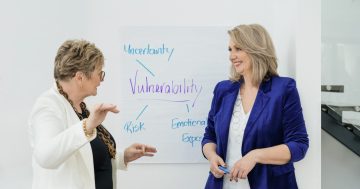Sarah Myhre* says women’s leadership won’t be a panacea for the overwhelming white maleness of climate leadership, but it’s a starting place.

Image: Coco Parisienne
On the back of a horse outside Yellowstone National Park in August, I cracked a joke with a friend next to me: “I’m gonna let you finish about your PhD and book tour there,” I ribbed her.
“But you’ll need to make space for the voices that really matter here.”
“You know, the voices of apolitical, middling, literary White men with big feelings.”
With grim laughter, we commiserated on the miserable lens that so many male writers and editorial gatekeepers use to frame climate change in the public eye.
Examples of this problematic, patriarchal frame in climate storytelling are ubiquitous: men debating the meaning of words, men explaining ennui, or men succumbing to feelings of despair.
These men and their words circumscribe the public’s moral imagination of the future we are choosing to leave for our children.
Their stories limit our collective understanding of the world.
I was in Montana for a summit of women leading on climate change and, in sessions together, we convened on the state and nature of feminist climate leadership.
There are very few places, professionally or personally, that many of us can go to be fully seen and held in the grief and wounding that comes with this work.
We chew and swallow the grief and violation being done to our Earth and its people every day, and it is a bitter pill.
One thing is clear: women’s leadership on climate change is vital.
Vast webs of influence across global energy, finance, and political leadership prevent meaningful action on climate change.
Fossil fuel companies, and the web of profiteering and exploitation connected to them, are the most powerful economic and political entities that have ever existed on the planet.
They represent the most entrenched and violent oligarchs on the planet.
And these entities are run by and for White men and their power.
Consolidated power in White men’s leadership dominates all sides of this problem.
Men in science, politics, business, finance, non-profits, men in the media.
Even when men are on the “right side” of this issue, they are often transacting in unaccountable, narrow, or even abusive ways.
Across platforms and professions, men are still the gatekeepers of power, able to obliterate the careers and accomplishments of women in public with a tweet, a boardroom whisper, or by simply staying silent as their female colleagues are disrespected, erased, or worse.
This mythology of the White male saviour solving the climate crisis with some kind of patented technology is so prevalent that it’s actually a trope.
Consider the recent film Ice on Fire, produced by Leonardo DiCaprio, which featured 20 White men, 10 White women, and one Black man talking about climate solutions such as trees and algae.
Meanwhile, B-roll footage unravelled of hundreds of people of colour from the Global South being essentially “saved” by such solutions.
Congratulations, people of colour and poor folks around the world, White guys with carbon-capture technology are here to save you!
The narrowness and unaccountability of climate leadership and storytelling norms exist in stark contrast to what is actually necessary to address the nature of the crisis at hand.
Because what is needed now is the comprehensive deconstruction of the profit model and attendant webs of power woven by the fossil fuel industry and its subsidiaries.
We must also reimagine our relationship with the planet and each other.
When unpacking the systems of harm around climate change, we reveal violation upon violation, like layers around an onion — and a feminist, anti-racist intersectional lens is necessary to understand these interconnected systems of harm.
Because what we are really trying to do is root out and reveal how the pain and suffering of certain people is erased and dismissed, while the pain and violation of others take centre stage.
This is the lens of moral attention — and it is foundational for global climate leadership.
I do not view “women’s leadership” as a panacea for addressing the systemic root of bankrupt leadership, because of the unholy alliances among White feminism, White supremacy, and colonialism.
This is not an original thought.
Often, the way White women build power — which is one of the ways I have negotiated my own career — is to attach to and align with the power of specific White men.
You know, the good ones, we tell ourselves.
We are complicit to get a seat at that table, where, we tell ourselves, we can do some good.
One of the hardest things about the struggle within White feminist leadership is that, even in the centre of the movement, we are still not fully divested from the leadership and currency of White male power.
Moreover, we are dishonest with ourselves about it.
Such men, and the alliances that many White women have used to gain power and access, were present as spectres among us in Montana.
They are the axes of power that we have the privilege to rotate around.
We tell ourselves that it is worth it to get a seat at the table — and this is the biggest lie of all.
Because, in truth, we are only violated further, at higher levels, in more damaging ways, from these alliances.
And, moreover, we White women are complicit in the continued violation of our colleagues and sisters who are Black, Indigenous, and other women of colour.
The power we gain from supplication is a poison pill.
The solution is comprehensive divestment from patriarchy and White colonial supremacy.
Here is the thing about feminist leadership: it is gut-wrenchingly hard.
It is the deep work of reconciliation, justice, and accountability.
The kind of courage it takes to confront the entrenched power of the fossil fuel industry is the same kind of courage and moral lens that it takes to dismantle my alliances with White male power, with the same profile of retaliation and risks to physical, bodily, economic, and public harm.
Maybe these collective steps on the path will change the world for the better, as we firmly knit ourselves into the long arc of the struggle for justice for life itself on this finite and fragile planet.
That hope is my North Star as I cross these rough and warming waters.
* Sarah Myhre is a scientist, writer, and Executive Director of the Rowan Institute. She tweets at @SarahEMyhre.
This article first appeared at www.yesmagazine.org.











